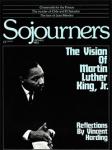In this issue of Sojourners, we have reprinted Martin Luther King Jr.'s 1967 speech "Beyond Vietnam" and Vincent Harding's reflections on its significance today. Although we rarely print a previously published article and even more rarely one that is almost 16 years old, two major considerations moved us to make an exception this month. One is, of course, that King's birthday on Jan. 15 makes this issue an appropriate one in which to recall his life and message. But more important, as Harding makes plain, King's speech carries a compelling, prophetic word for our current political and economic situation.
King's speech was a powerful moral indictment of the Vietnam War, including a summary of Vietnam's history that laid bare the falsehoods underlying U.S. involvement. That in itself is a story worth retelling at a time when our president frequently revives those falsehoods in his public statements.
King also suggested that the crisis precipitated by the Vietnam War pointed to deeper questions about both the United States' role in the world and its domestic political and economic institutions. To King in 1967, the war was the most recent evidence that the U.S. had chosen to be on the wrong side of a global revolution and that this choice had been dictated by what he called "the giant triplets of racism, materialism, and militarism" dominating American society. In short, King urged his audience to ask some very fundamental and even radical questions about what kind of country the U.S. was going to be in the remainder of the 20th century.
Today we do not have hundreds of thousands of U.S. troops fighting an interventionary war as we did in 1967. But the questions to which King pointed are perhaps even more pressing, as the news' daily litany of deepening involvement in Central America, MX madness, budget cuts, and unemployment figures makes all too clear.
The questions King raised are never heard in the mainstream of U.S. politics today. This silence does not mean that the questions have gone away; it only means that since Vietnam the forces of the "giant triplets" have regrouped to put the clamps on debate.
Much talk in the political mainstream revolves around the need for new ideas and fresh alternatives with which to face our current crises. But that talk is deceptive. What is usually being sought is not a genuine alternative but some quick-fix technical breakthrough that would shore up the status quo. But as the "Beyond Vietnam" speech indicates, in the last years of his life, King was articulating an authentic alternative social vision and taking tentative steps toward putting that vision into specific demands for radical social change.
King's alternative was not one based on ideology or technique. It was based on the ancient biblical values to which most Americans claim some sort of allegiance. King's vision was of a society that would place the needs and rights of people, especially the poorest and weakest, above the drive for corporate profits or excessive consumption. That society would be defended by its righteousness and truth rather than by weapons of mass destruction. Such an alternative is as old as the teachings of Jesus and the prophets, but it still has a novel ring when proclaimed in the political marketplace.
The biblical radicalism of King's social vision was matched by the methods with which he struggled to implement it. He rejected the traditional options of pragmatic power politics and armed struggle for the nonviolent "soul force" of self-sacrifice and love that extended even to the enemy. In daily practice this meant nonviolent direct action and civil disobedience as well as massive campaigns of non-cooperation through strikes and boycotts. In his last years, King was increasingly moving away from a political style that relied heavily on the mutual accommodation of leadership elites toward one that sought to empower the masses of low-income people through grassroots organizing and action.
The alternatives that King held out to America are difficult and have little to offer those who seek the quick fix. The long-range benefits of equality and sharing are usually not as apparent as is the immediate gratification of greed and exploitation.
The state and corporate power arrayed against such a nonviolent revolution is staggering to contemplate. According to Stephen Oates' recent biography of King, Let the Trumpet Sound, when King's advisers were planning the Poor Peoples Campaign, they knew that they were going to "confront the economic foundations of the system and demand reforms," an action which is "what the powers of the country will kill you for."
King's death reminds us that the cost of a different kind of America will be very high. But the vision for which King lived and died is still the only one that holds any hope for making a break in the cycle of oppression and war that is leading the world to disaster.
In recent years much of the interest and activity around King's life and message has centered on efforts to have his birthday made a national holiday. If there is any American who deserves to be so honored it is King, for he represents both the 400-year-old black freedom struggle and the best hopes and aspirations that lie, usually dormant, in the American people as a whole. But whether or not the state chooses to recognize King, the churches should certainly hold him up as one who in his life, his preaching, and his death staked out a direction for our witness to the love of Christ and the justice of the kingdom in these dark and discouraging times.
Danny Duncan Collum was an associate editor of Sojourners when this article appeared.

Got something to say about what you're reading? We value your feedback!
